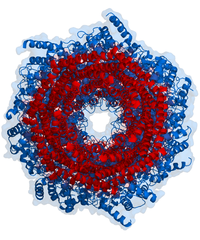
Photo from wikipedia
Graphical abstract Figure. No Caption available. ABSTRACT Cannabis is the most consumed illicit drug worldwide. Its principal psychoactive component, &Dgr;9‐tetrahydrocannabinol (THC), affects multiple brain functions, including cognitive performance, by modulating… Click to show full abstract
Graphical abstract Figure. No Caption available. ABSTRACT Cannabis is the most consumed illicit drug worldwide. Its principal psychoactive component, &Dgr;9‐tetrahydrocannabinol (THC), affects multiple brain functions, including cognitive performance, by modulating cannabinoid type‐1 (CB1) receptors. These receptors are strongly enriched in presynaptic terminals, where they modulate neurotransmitter release. We analyzed, through a proteomic screening of hippocampal synaptosomal fractions, those proteins and pathways modulated 3 h after a single administration of an amnesic dose of THC (10 mg/kg, i.p.). Using an isobaric labeling approach, we identified 2040 proteins, 1911 of them previously reported in synaptic proteomes, confirming the synaptic content enrichment of the samples. Initial analysis revealed a significant alteration of 122 proteins, where 42 increased and 80 decreased their expression. Gene set enrichment analysis indicated an over‐representation of mitochondrial associated functions and cellular metabolic processes. A second analysis focusing on extreme changes revealed 28 proteins with altered expression after THC treatment, 15 of them up‐regulated and 13 down‐regulated. Using a network topology‐based scoring algorithm we identified those proteins in the mouse proteome with the greatest association to the 28 modulated proteins. This analysis pinpointed a significant alteration of the proteasome function, since top scoring proteins were related to the proteasome system (PS), a protein complex involved in ATP‐dependent protein degradation. In this regard, we observed that THC decreases 20S proteasome chymotrypsin‐like protease activity in the hippocampus. Our data describe for the first time the modulation of the PS in the hippocampus following THC administration under amnesic conditions that may contribute to an aberrant plasticity at synapses.
Journal Title: Biochemical Pharmacology
Year Published: 2018
Link to full text (if available)
Share on Social Media: Sign Up to like & get
recommendations!